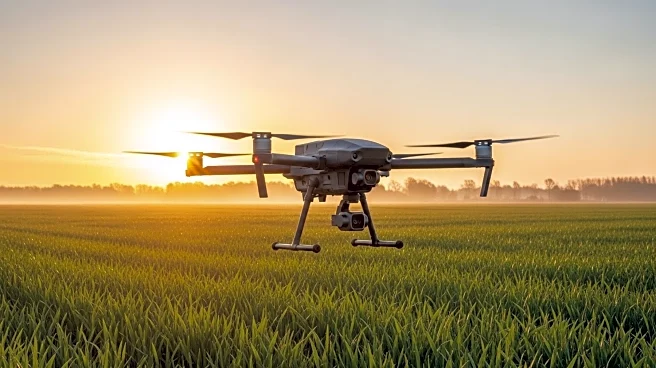What's Happening?
The United States Farming as a Service (FaaS) market is experiencing significant growth, with projections indicating it will reach $16.96 billion by 2032. This growth is driven by a compound annual growth rate (CAGR) of 17.12% from 2025 to 2032. The market, which was valued at $4.79 billion in 2024, is expanding due to increased adoption of digital agriculture technologies and services. Key players in the market include Green Agrevolution Pvt. Ltd., EM3 Agriservices Private Limited, Trimble Inc., and CropX Inc. The sector is seeing a rise in mergers and acquisitions, with a 19% increase in AgTech transactions in Q1 2025 compared to the previous year. This trend is attributed to improved farmer sentiment and expectations for higher farm income.
Why It's Important?
The rapid growth of the Farming as a Service market is crucial for the U.S. agricultural sector, as it reflects a shift towards more technologically advanced farming practices. This transition is expected to enhance productivity and efficiency, benefiting both large-scale commercial farmers and smallholder farmers. The increased investment and interest in AgTech can lead to more sustainable farming practices, potentially reducing environmental impact and improving food security. As the market expands, it could also create new business opportunities and jobs in the agricultural technology sector, contributing to economic growth.
What's Next?
As the Farming as a Service market continues to grow, stakeholders can expect further advancements in digital agriculture technologies. Companies may focus on developing more sophisticated farm management solutions, production assistance, and financial services tailored to the needs of farmers. Additionally, the rise in mergers and acquisitions suggests that consolidation in the AgTech industry could lead to more integrated service offerings. Policymakers and industry leaders may need to address regulatory challenges and ensure that technological advancements are accessible to all farmers, including those in marginalized communities.
Beyond the Headlines
The expansion of the Farming as a Service market could have broader implications for global food systems. By adopting digital agriculture technologies, the U.S. could set a precedent for other countries, encouraging international collaboration and knowledge sharing in sustainable farming practices. This could lead to a more resilient global food supply chain, capable of adapting to climate change and other challenges. Furthermore, the integration of technology in agriculture raises ethical considerations regarding data privacy and the digital divide, which stakeholders will need to address as the market evolves.










